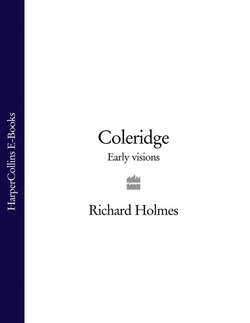Читать книгу Coleridge: Early Visions - Richard Holmes - Страница 23
7
ОглавлениеIn his happier recollections Coleridge described his final period as a Grecian, between 1790 and 1791, as “the era of poetry and love”. With Bob Allen and Val Le Grice he would escort the three Miss Evanses (Anne, Eliza, and Mary) home on a Saturday, from their milliner’s shop in the West End to the family house at Villiers Street, off the Strand. On summer mornings they would carry “the pillage of the Flower Gardens within six miles of Town with Sonnet or Love-rhyme wrapped round the Nosegay”.33
Even Bowyer’s teaching of poetry became a pleasure and fascination, according to Coleridge. “At the same time that we were studying the Greek Tragic Poets, he made us read Shakespeare and Milton as lessons…I learnt from him, that Poetry, even that of the loftiest and, seemingly, that of the wildest odes, had a logic of its own, as severe as that of science; and more difficult, because more subtle, more complex, and dependent on more, and more fugitive causes.”34
Both Lamb and Leigh Hunt deny that Bowyer’s teaching of poetry was any more than “commonplace”, and that his taste in moderns reached any higher than Pope. Perhaps Coleridge responded more subtly than they; but in reality he seems to have gained this crucial insight into the structure of poetry from his own reading of Bowles and Edward Young.*
Nevertheless he claimed too that Bowyer was an early champion of the plain style: “he showed no mercy to phrase, metaphor, or image, unsupported by sound sense…Lute, harp, and lyre, muse, muses, and inspirations, Pegasus, Parnassus, and Hyppocrene were all abominations to him.”35 Perhaps this was so; but the fact remains that his main contribution to the Christ’s Hospital “Album” for 1790 was the highly ornate “Monody on the Death of Chatterton”, packed with eighteenth-century personifications, and opening with full bardic diapason: “Now prompts the Muse poetic lays” – the very style that Bowyer was meant to abominate.
The truth seems to be that he was experimenting with every kind of poetic style and pose. His worship of Chatterton was genuine, and he had copied Bowles’ “Monody on the Death of Henry Headley” into his hymn-book to inspire him. But this did not prevent him from turning the solemn enterprise on its head with an answering “Monody on a Tea-Kettle” for George:
While Bats shall shriek and Dogs shall howling run
The tea-kettle is spoilt and Coleridge is undone!
In March 1791 he also sent his brother a Pindaric ode on Euclid’s geometry of ghastly ingenuity. His accompanying comment on learning mathematics – a thing he could never do – contains an interesting prophesy of critical debates to come: “though Reason is feasted, Imagination is starved: whilst Reason is luxuriating in its proper Paradise, Imagination is wearily travelling over a dreary desert.”36 Those images of fruitful Paradise and sterile desert were to haunt him long after.
